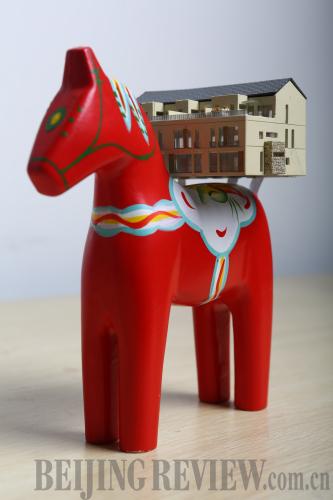|
 |
|
NEW YEAR LUCK: A toy mascot heralding the Year of the Horse is a hot seller, nicknamed Ma Shang You Fang. The name is a play on words that means both "house on a horse" and "to have a house soon" (IC) |
They wish to have a Horse baby through artificial intervention, such as "test tube" babies, according to Wu Xueqing, director of the reproductive center. Founded in November, 2004, the center was the first in Shanxi Province to qualify for using embryo pre-implantation genetic diagnosis and assisted reproductive technology.
"From a medical viewpoint, I suggest that couples choose to have babies naturally at the proper time and under the best physical conditions. After all, the most important thing is that the baby is healthy," said Wu.
Actually, Shanxi is not the only province to experience a baby boom. The boom experienced all over China has also brought a surge in the child care and housekeeping service market. According to a manager of a housekeeping service company in Taiyuan, capital city of Shanxi, although the year 2014 has just started, most of the company's maternity nannies have already been booked with their average salary rising to 5,800 yuan ($959) a month.
In fact, the salary of maternity nannies is even higher in big cities such as Beijing and Shanghai, where demand for the service is high. Their job is to provide professional care for new-born babies and the mother. In Beijing, the salary can be over 10,000 yuan ($1,654) a month.
Totem worship
"As a symbol, the Chinese zodiac is a form of cultural entertainment or a psychological need for people," said Gao Zhuancheng, Director of the Institute of Sociology under the Shanxi Academy of Social Sciences.
Since ancient times, the legends and custom centering around the Chinese zodiac have been a source of imagination and an exploration of the origin of human beings. As an important part of China's folk culture, the zodiac is deeply rooted in mythology and contains rich connotations. For instance, even today, the Chinese people still attach great importance to the year that they were born in and pay special attention to recurring years in the zodiac cycle, known as benmingnian.
In benmingnian, people usually, regardless of age or sex, wear red belts, socks, underwear, and wrist ornaments to exorcise evil spirits and invoke blessings throughout the year.
"Basically, the Chinese zodiac is an outcome of animal worship. The zodiac animals were chosen because of their close relationships with our primitive ancestors," said Wan Jianzhong, a folk culture professor and doctoral supervisor at Beijing Normal University.
The existence of animals was a matter of life and death in ancient times, thus a contradictory psychology was formed: On the one hand, people had to eat the animals, but on the other hand, they worshipped the animals and wished the animals could grow well so they could provide regular food and everyday articles.
"It was against this backdrop that the earliest zodiac and totem worshiping came into being in China," said Wan.
"The characters of the animals and their connections with human beings decided the degree of the worship," said Wan.
Undoubtedly, the first animals that human beings worshipped were those closest to their life, such as the ox, horse, sheep, rooster, dog, pig and rabbit. The dragon, snake and tiger are the totems of the Chinese nation. Although the dragon is a mythical creature, its mysterious authority already existed in the Chinese nation as early as 6,000 or 7,000 years ago. The monkey is the only animal similar to people, so worship of it is not surprising. The rat, which has a bad reputation, has long existed in human being's lives, so it is also chosen as a zodiac animal.
Email us at: yuyan@bjreview.com |
